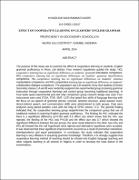| dc.description.abstract | The purpose of this study was to examine the effect of cooperative learning on students, English grammar proficiency in Wuro Juli district. Four research hypotheses guided the study: HO1 cooperative learning has no significant difference on students’ grammar articulation competence, HO2 cooperative learning has no significant differences on students’ grammar identification competence, Ho3 cooperative learning has no significant differences on students’ sentence manipulation competence, and HO4 cooperative learning has no significant difference on students’ collaborative dialogue competence. The population was 134 students; forty nine students of Senior Secondary classes 1 A and B were randomly assigned into experimental group (receiving grammar instruction through cooperative learning) and control group (receiving traditional teaching). A Four-week quasi-experimental post-test only comparison group research design was used. Four instruments were used (TGA, TGR, SMT, LST) that tested four skills of language learning with the focus on six aspects of grammar (tenses, concord, sentence structure, active-passive voice, direct-indirect speech, and summarization skill) were administered to both groups. Data were analyzed using paired-samples t-test with the help of SPSS version 17.0. The general finding indicated that, the cooperative learning group outperformed the comparison group that use of traditional method in teaching English grammar proficiency. The finding for HO1 indicated the there is a significant difference (p=0.00) with 0.5 effect size which shows that the HO1 was rejected; the finding of the HO2 was P=0.00 and the effect size was 0.7 which showed the significant difference between the two groups, the same result obtained in the other, two HO3 and HO4 all showed that the null hypotheses were rejected and alternative hypotheses were accepted. It was observed that these significant improvements occurred as a result of promotive interaction, interdependence and equal participation. In conclusion, the study indicates that cooperative learning is very effective in acquiring grammar knowledge. Therefore, it is strongly suggests that cooperative learning method of teaching should be infused into English language teaching and other subjects teaching in all schools in Nigeria in order to decrease the mass failure in the examinations | en_US |

